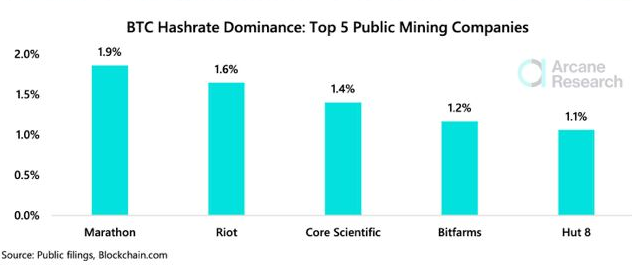[ad_1]
The Bitcoin mining landscape has undergone shifts over the past year due to China’s crackdowns. Here’s some data that shows how decentralized the BTC network currently is.
State Of Decentralization On The Current Bitcoin Mining Network
One way to study about decentralization in the BTC mining network is to go through hashrate dominance data of the major mining pools and companies.
The “hashrate” is an indicator that measures the total amount of computing power currently connected to the Bitcoin network.
Higher the value of this metric, more is the mining power on the chain, and hence better is the overall performance.
On the Bitcoin network, there are several big publicly-traded mining companies present. The percentage of the hashrate each of them make up for may shed some light on the degree of the decentralization on the BTC blockchain.
Here is some data from Arcane Research that shows the hashrate dominance of the major mining companies:

Marathon seems to make up for the largest share of the BTC hashrate | Source: The Arcane Research Weekly Update - Week 2
As you can see in the above graph, Marathon, the largest of the Bitcoin mining companies, makes up for just a little less than 2% of the hashrate.
The five biggest mining companies in the market combined control around 7% of the total hashrate on the BTC blockchain.
Related Reading | Bitcoin Spot Volume Nose Dives To Lowest Since Summer Selloff
This isn’t that big a percentage so this picture of the network may suggest that the network is relatively decentralized.
However, many major mining companies actually combine their hashrate and mine under the various “mining pools.”
The below chart shows how the hashrate is distributed among the major Bitcoin mining pools.

AntPool seems to account for 16% of the total hashrate | Source: The Arcane Research Weekly Update - Week 2
Now this data, on the other hand, makes the Bitcoin network look more centralized. The largest mining pool, AntPool, accounts for 16% of the hashrate alone.
The five largest pools make up for 70% of the total hashrate on the BTC blockchain. This is a pretty significant number.
Related Reading | Update: Intel’s Bitcoin-Mining Chip “Bonanza” Bags Mining Startup As First Client
The report concludes that the bottleneck for Bitcoin decentralization lies not among mining companies, but mining pools. As such, decentralized mining pools may be the way to go for decentralization in the future.
BTC Price
At the time of writing, Bitcoin’s price floats around $42k, down 4% in the last seven days. Below is a chart that shows the trend in the value of BTC over the last five days.

BTC's price has moved sideways in the last few days | Source: BTCUSD on TradingView
Featured image from Unsplash.com, charts from TradingView.com, Arcane Research
[ad_2]
Source link



